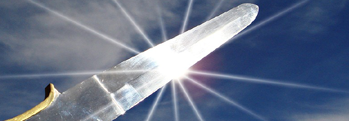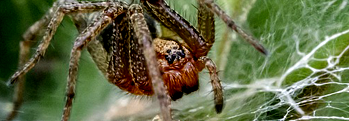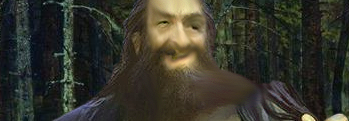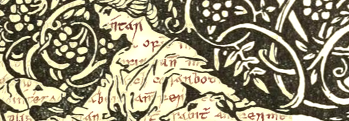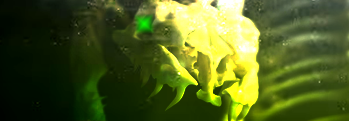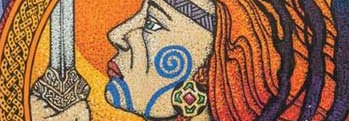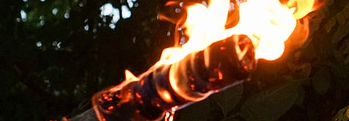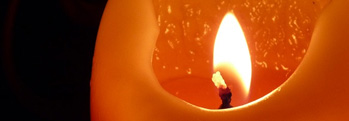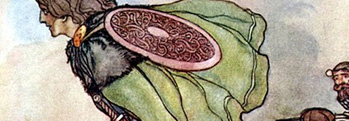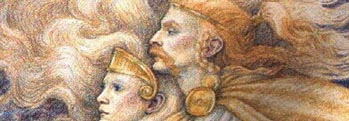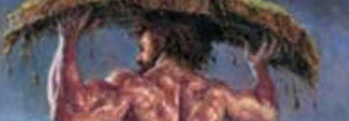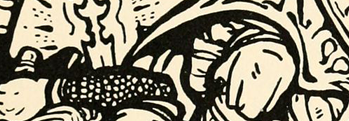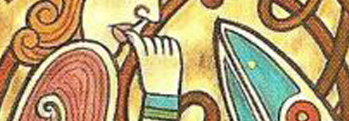The Witch of the Mists
Irish and Celtic myths and legends, Irish folklore and Irish fairy tales from the Fenian Cycle
Fionn Mac Cumhaill does battle with sword and sorcery
 Fionn Mac Cumhaill stood at the door of his hunting lodge with his fists on his hips, his heart sinking as he realised his intentions to hunt for deer this day were lost in the waves of mist and fog that had rolled in from Dublin bay, although at that time it was known by a different name. It had come as far inland as Gleann na Smol, the Glen of the Thrushes, and he could hardly see further than a stone's throw.
Fionn Mac Cumhaill stood at the door of his hunting lodge with his fists on his hips, his heart sinking as he realised his intentions to hunt for deer this day were lost in the waves of mist and fog that had rolled in from Dublin bay, although at that time it was known by a different name. It had come as far inland as Gleann na Smol, the Glen of the Thrushes, and he could hardly see further than a stone's throw.
He smiled then, for he recalled many a fine and sunny day that had begun drowned in fog, and went to wake the rest of his party and leash the two doughty hounds, Bran and Sgeolan.
Up and up they went over goat paths into the high hills, until the hounds gave throat and they saw a curious deer spring from amidst the bracken, with one side white and the other entirely black! Both dogs were set free and they chased the deer through the mists for many hours, even as the sun set, when calamity struck – they had lost track of their dogs and the deer too!
As if that wasn't bad enough, they themselves had gotten lost and weren't at all sure what part of the country they were in. Now in poor form, tired and hungry, the Fians began grumbling, until Conan Mac Morna spoke up to Fionn.
“Better for me and for us all if we had just stayed in bed this day!” he said, “rather than following your famous wisdom, which was not enough to keep your own dogs at heel! It is a great wonder you've lasted this long as our leader, and the Fians haven't put me in your place yet!”
Everyone burst out laughing, for Conan was known as the jester of the Fianna and none paid him any heed. Oisín came to Fionn and asked him if he could in truth find some trace of the dogs.
Fionn put his bewitched thumb into his mouth, that thumb which had been burnt on the salmon of knowledge, and answered that only Bran would return of all their sweet-tongued dogs.
The Fianna sank into deep despair at this certain utterance, for they had brought only the best and swiftest of their hounds on this hunt, and well did they love their dogs. Again Conan spoke to Fionn:
“Every time I go out with you I get in some kind of scrape or trouble, oh Fionn, and now chasing some moon-beast I have lost the two best hounds I have, whose like are to be found nowhere under the sun, so you'll get no peace from me until you have replaced them with two of quality as fine!”
No sooner had he finished speaking however than they heard a distant, piteous cry, and soon after Bran appeared, tired and wet and covered in bog-mire from head to toe. She lay before Fionn and howled a long and mournful howl.
“I think,” said Fionn, “she knows of some unknown danger which threatens us from the mists, and would tell us if she could but speak.”
“And what worse can happen to us than the loss of our swift and gentle hounds?” asked Diarmuid. “I would rather have bled from fifty battle-wounds than have this thing happen!”
They all turned at the sound of rustling in the bracken close by, where a woman emerged from the moonlit mists. She was beautiful, with long fair hair flowing down to the hem of her silver-woven dress, and she spoke to their astonishment.
“Surely you are Fionn, lord of the Fianna? There is a woman not far from here who wishes to meet you, and has prepared a great feast in your honour.”
“At last some good news,” interrupted Conan hurriedly, “I should very much like to meet her now!”
The woman smiled, and courteously included Fionn's companions in the invitation. They went some short distance to a house built atop a little hill overlooking an inlet of the sea, and all followed her into the house. When the fine and hearty supper was ended Fionn asked about the woman who had invited him to this place, for he wished to convey his thanks.
Just then a woman came in, and Fionn recoiled for he thought he had never seen a woman so ugly, with a face like a bulldog licking widdle off a nettle. One side of her face was white, the other black, and her hair was like grey mist waving round her head.
“Good evening” said she to Fionn, “I know you well as the greatest hero of Ireland, and your fame is what caused me to summon you, so I could have a look at you, to see if I liked the looks of you! And I do, so you shall be my husband and share in all of my riches.”
Fionn nearly choked on his mead and shock caused his normally courteous tongue to run free.
“ Not all the treasure in the world would induce me to take you for my wife,” he coughed, and continued “and you know I can't help but think you have some relationship with that strange animal we hunted today, and through which we have lost our precious hounds. Tell me what happened to them?”
“Dead, all dead!” she cackled, and her face gleamed with mad delight, “along with many brave heroes I have slain too, and if you refuse me no power of yours will save the Fianna from my wrath!”
At this outburst Fionn and the Fianna laughed scornfully, amused that this magpie-woman thought of not just fighting them but slaying them too, after their many victories!
“Laugh,” she said quietly, “soon you will laugh no more. But before your long rest I will play and sing for you, if you like.”
She took a small but ornate harp of very ancient style from a rusted chest and played for them, and the music was like the rippling of a rock-strewn mountain stream, or the susurrus of the night wind when it plays through tall pines in summer. Then she chanted a little song to them in an unknown tongue which seemed yet familiar, and a strange helplessness relaxed their limbs. Although they felt that some great disaster was about to overtake them they had no strength to avert it!
Seeing her witchcraft had conquered the men, she laid aside the harp of the Dagda, for none other was it, and took up instead a sharp sword of two bitter edges. From one warrior to the next she went, slaying the helpless heroes without mercy, mocking their lethargy! Seeing the slaughter, Fionn cried out:
“Spare my men but kill me if you like, for it was I who scorned you!”
The woman only laughed and turned to continue, but Fionn said
“How can I take you for my wife when the daughter of Goll mac Morna has shared my house for years? If I put her away Goll will surely kill me, and that would be no benefit to you.”
The witch considered for a moment, then she said cheerfully:
“I will go and kill Goll. In the meantime I will restore to you and your surviving men freedom to move – but do not think to escape, for I have placed a geas upon you that holds you to this place.”
The next morning at Ben Edair, which we know today as the Hill of Howth, Goll mac Morna walked from his house upon hearing a hue and cry from his men, and looked down at the harbour, where a grey mist was receding. Several ships had appeared and distant figures were looking back at him!
“Bad luck to us that Fionn is away,” Goll muttered, “for these are no friends of ours, I think!” He sent Caeilté to go and speak with these strangers and find out what they wanted, and so Caeilté rowed a currach out to the waiting ships.
“Goll mac Morna sends you greetings, and wishes to know what purpose has brought you here, and whether he can render you any service,” he said.
“Go back and tell Goll I have come to kill him and all his Fians, as I have killed those with Fionn,” said the woman, and she glared at Caeilté so venomously, and looked so dreadful, that he slipped down the side of the ship into his boat and hurried away.
“Never before have I fled from anyone, and for shame I cannot hold up my head again among the men of Ireland until I have put an end to that woman,”said Caeilté after telling Goll what the woman had threatened. Then they grieved for never again would they see their chief, Fionn, or so they believed, and the warriors gathered around raised a battlecry of fierce vengeance!
It was near noon when the watchers reported that a great host of warriors led by a fog-haired woman were coming ashore in small boats, so Goll sent Caeilté to the shore with his warriors to try and stop them from landing.
There was a fierce, brief battle but Goll's men were overcome and many slain by spear, sword and witchcraft.
When Goll saw how it was going, he called out to the woman that there should be peace between them this night, and they could fight again in the morning.
“I will let the last of your Fians go free, Goll mac Morna,” she answered, “if you will agree to meet me in single combat. If you will not, I will fight on until you are all dead.”
Goll agreed against the objections of his men, and the rules of the fight were set as follows: only one was to walk away alive.
 The next morning he armed himself and went down to the strand, and the whole of that day he and the woman fought together, neither gaining the victory, and for two days after they met again, striking many hard blows. On the evening of the third day, when Goll lay down to sleep, he was so laced with bleeding wounds he feared he must surely lose on the morrow.
The next morning he armed himself and went down to the strand, and the whole of that day he and the woman fought together, neither gaining the victory, and for two days after they met again, striking many hard blows. On the evening of the third day, when Goll lay down to sleep, he was so laced with bleeding wounds he feared he must surely lose on the morrow.
Back in the fastness of the mist witch, one of the guards keeping watch over Fionn had a beautiful daughter called Eithne, and she would often sit near and listen while they spoke of past adventures. Gentle and sweet she seemed, most unlike the mist witch, and each time Diarmuid O'Duibhne saw her, he loved her more deeply.
“If I were a free man,” he said to her one evening, “I would ask you to leave your people and come to be my wife. But alas, no matter how we try, we cannot break the geas that old witch has laid on us.”
“How can I be sure of your love?” she answered doubtfully, “am I not one of your enemy's clan?”
“By sun and wind I swear I speak only the truth!” he vowed, and she knew he truly loved her, for he had spoken the secret names of two of the powers of the Tuatha in his passion, and if he lied he would be punished most terribly.
“I give you my love, and I will follow wherever you go,” she said softly, “this night you will be free, for I have a lay of power unknown to the enchantress, and it will release you from the geas.”
And that very night it came to pass just as she said – while all in the camp slept except the Fianna, she came to them as one prepared for a journey, and standing over them she lifted her hands and spoke these words:
By the light of suns afar
And the guiding, distant star
By the mystic new-born moon
And the lilt of magic rune,
You are freed from the ill spell.
Take your swords and let us go,
From this place of death and woe
Leave this shadowy land behind
And the words that hold and bind
Now my bidding breaks the spell.
The men stood and were delighted to find their strength had come back to the. The stood around Eithne and thanked her profusely before gathering their swords and shields and readying themselves to leave.
Suddenly and to the great horror of Fionn and the Fianna, the villain Conan Mac Morna lifted his sword and with a single blow severed the beautiful head of Eithne from her body! All stood aghast, for they knew him to be a braggart and some suspected him of cowardice, but that such treachery had slumbered in his bosom none had suspected!
Diarmuid was enraged and swiftly drew his own sword, crying
“If you had a hundred heads I would hew every last one from your coward's body and not think it too many!”
Conan knew what fear was in that moment I can tell you! But Oscar stepped between them and counselled wisely that they should not tarry long, for Goll Mac Morna was surely pressed hard by the witch, and they could deal with the coward later, in such a way that his name would never be forgotten.
With great reluctance Diarmuid left the matter and they travelled swift and sure through the hours of the night, reaching Ben Edair as Goll painfully raised his spear for the next day's battle, hardly able to stand.
Fionn and the Fianna clamoured to go forth and fight the invaders, but Goll would have none of it - he had made an agreement and would stick to it. In the end Fionn had to use his full authority to forbid him to go forth that day, and sent Oscar in his place.
The witch was astounded to see Fionn freed from the geas and standing before her, but her anger was the greater, and she leapt into battle with Oscar, and for the length of the whole day they fought.
In truth, Oscar was having the worst of it and as the sun began to set he tottered, but Fergus, who was the Bard of the Fianna, called out to him.
“O Oscar, son of Oisín, you who have never before been conquered, let it not be said that an evil enchantress vanquished you. Remember, Oscar, that hour when we lay fettered by evil bonds in the Bay of Inch, and forget not the death of thy comrades!”
His brave words strengthened Oscar's failing arm, and with a swift leap forward he struck the witch with his spear. She wavered on her feet for a moment, then with a great cry fell forward on the sand and died.
The Hill of Howth can be found on the map below!
More Legends from the Fenian Cycle
The days of the heroes of the Fianna have captured the imaginations of many throughout the ages, and one such was the ninth century poet Gofraidh Fionn O’Dalaigh, one of the finest poets in all of Killarney and all of Ireland. For it was his pen and none other that first put quill and ink to parchment and recorded the old story of Reicne F ... [more]
It was a fine day in Ireland many years ago when Fionn and his Fianna took a fancy to go out hunting. Warm was the sun amid the whispering glades of ancient forests, gentle was the breeze and sweet the scent of summer flowers in its bosom. Sweeter yet was the sight of a mighty deer to the eyes of the hunters, and so they gave chase, howling with de ... [more]
It was in the days of Fionn and the Fianna, a very long time ago in Ireland, that the people of Ben Edair decided to hold a festival, a Feis or Aonach, to celebrate the season. All of Fionn’s hosts were gathered, the seven ordinary warbands and the seven extraordinary warbands, and they danced and played music merrily with the people. Then ... [more]
There are few these days who have not heard of Fionn Mac Cumhaill, hero and defender of Ireland, or at least might recognise his name. But there were no creatures that Fionn loved amongst his three hundred dogs more than his two favourites, Bran and Sceolan, meaning Raven and Survivor, and though it’s a stranger story than most, this is the t ... [more]
It is not unusual for stories in the Irish legendarium to have more than one meaning besides that of a literal recounting of historical events, whether by accident or by design. Some tales were meant to be understood in the context of the era and culture of the story teller, while others might instruct in certain arts, and yet others contain myster ... [more]
Those monks who recorded the mythologies and folklore of Ireland which had previously been passed down by word of mouth from bard to druid to bard for countless generations were, by their very nature, devout Christians. As Christians they were dedicated to not only God and His Church, but to the people who bore and nurtured them, and everywhere the ... [more]
One day Fionn Mac Cumhaill, doughty hero of Ireland, and his friends Goll, Cialta and Oscar, as well as others of the Fianna, were resting after the hunt on a certain long hill now known by a different name. Their meal was being made ready, when what should happen only a girl of the kin of the giants came striding up and sat down among them, a grea ... [more]
Something which often appears in the most ancient tales of Ireland is the grisly vision of heads which speak after being separated from their bodies! This was said to be an art of the druids inherited from the necromancy of the Dé Danann, who were themselves said to be able to raise a whole army from the grave to fight again day after day! ... [more]
There once was a young fellow called Conall, and he lived with his parents in the east of the country. They lived a quiet life, catching fish and digging up oysters for meat and lamps, but one dark day the Fomors came and demanded tribute. Having none to give, his father bid the sea demons begone, but instead they made to take himself and his famil ... [more]
Young Fionn Mac Cumhaill was out walking with his dog Bran one fine morning, and he happened to pass into a deep and thick dark wood of the kind that once covered all of Ireland, for the hunting was better there, when what did he come across but a thousand horses hauling timber and men chopping down the trees and preparing the logs. "What a ... [more]
There was a mighty warrior in the west of Eriu, and Cumhal Mac Art was his name. Feared was his axe and he could skewer two men with a single cast of his feathered war-dart, and yet for all that he lived a lonely life, and a life of fear – for it had been foretold that should he ever marry, he would die in battle the very next day! But all ... [more]
It was in the day of Fionn Mac Cumhaill when he was an old man, yet still hale and hearty, that one of his warriors, whose name was Diarmaid son of Donn and grandson of Duibne, had carried off his young bride-to-be, Gráinne daughter of Cormac! The two had fallen in love and Gráinne, for all of Fionn's fame, wanted nothing to do wi ... [more]
One warm summer's day Fionn and his men were out hunting through the darkling forests of Ballachgowan in Munster, chasing deer and boar through the gloomy glades, when they stopped short all of a sudden and came face to face with a startling sight! For what had stepped between them and their prey but a strange, damp giant of a man. Black wer ... [more]
Fionn Mac Cumhaill stood at the door of his hunting lodge with his fists on his hips, his heart sinking as he realised his intentions to hunt for deer this day were lost in the waves of mist and fog that had rolled in from Dublin bay, although at that time it was known by a different name. It had come as far inland as Gleann na Smol, the Glen of th ... [more]
When Fionn Mac Cumhaill became leader of the Fianna, the fiercest and most warlike of those bands of heroes who lived in the wild places, hunting and acting as champions for their kings, and defending Ireland from evil, he decided that he wished to have only the best warriors to follow him. So he sat down and sucked his thumb to taste the wisdom ... [more]
Close by where Limerick city stands today lie the ruins of an ancient and once mighty fortress called Carrigogunnel, which commanded all the lands about with a stern hand. It was known then as a place of ill omen, and it is known today as the same, for it was once the home of an uncanny hag by the name of Gráinne. Amid the surrounding mar ... [more]
A dark horde of fell-handed warriors approached Ireland, sails gathered off the coast like storm clouds, billowing out in the gusts of uncertain wind, while oars bent to the rolling thunder of drums. Fierce indeed was the host of King Colgan, master of Lochlainn, and he came to make war on Cormac Mac Airt, High King of Ireland! As soon as Fionn ... [more]
Diarmuid the Fair, son of Donn or Duibhne of the Tuatha De Danann was one of the Fianna, the great warriors of ancient Ireland who protected the land from dangers near and far. It was said that no woman could resist his gaze, for he'd been granted the blessing of comeliness by the Ghost Queen Morrigan after he helped her out of a spot of bother ... [more]
Fionn Mac Cumhaill and the rest of the Fianna were resting after a great battle, weary and sore with sorrow at the loss of their fellows, when they spied coming along the shores of Loch Lein in County Kerry a beautiful young woman riding a swift horse, so swift indeed that its hooves scarcely seemed to touch the ground! Now although the women of ... [more]
Now it is known by some that the fairies of Ireland weren't much like the fairies we hear about in these latter days, harmless things of mischief and frolic, but were instead respected and often feared, for their anger was quick and their kindness was whimsical. Some would join men in battle, and some would make war on men, others were omens of ... [more]
It was a fine brisk spring morning in Ireland when Fionn Mac Cumhaill decided to take himself for a stroll along the white sandy beaches of the seashore, the better to breathe the air and enjoy the simple pleasures life had to offer. But that morning, life had more to offer and it didn't look pleasant, for it was a giant bearing down on the bea ... [more]
Fionn MacCumhaill was well known as a fair and handsome man, but his most distinguishing feature was his grey hair - and he was not born with it! Fionn was one time out on the green of Almhuin, and he saw what had the appearance of a grey fawn running across the plain. He called and whistled to his hounds then, but neither hound nor man heard hi ... [more]
After his seven years of training with the poet Finegas were done, Fionn Mac Cumhaill took himself from the river Boyne to the great hall of the High King in Tara, Conn of the Hundred Battles, to present himself there as a member of the Fianna, the very best of the best warriors throughout Ireland. Announcing himself, Conn took him into the band an ... [more]
Here is the story of how Fionn MacCumhaill gained the knowledge of the world. And wouldn't it be a great thing to know it all? Still, knowledge and wisdom must be balanced, and this was known to the young man called Fionn, which means fair and bright. He was fleeing from the warriors who had murdered his father when he came upon the hiding plac ... [more]




